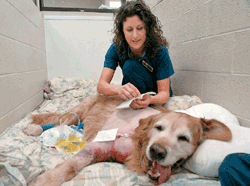2006 Firstline MVP Winner
Meet Paige Phillips, RVT, Firstline's 2006 MVP winner.
Meet Paige Phillips, RVT, Firstline's 2006 MVP winner. The Firstline MVPaward, sponsored by C.E.T. University, honors the team member who has made the biggest contribution to his or her practice and to thecommunity.

Paige Phillips, RVT
Phillips was chosen for her mentoring and team-building efforts. In 2004, Phillips launched an internal CE program for technicians at her hospital. Since then, she has planned training sessions on topics ranging from euthanasia and compassion fatigue to CPR and catheter placement. Phillips recently spoke with Firstline about her experience launching the practice's CE program.
FL: Why did you decide to launch a CE program?
Phillips: We were having trouble retaining staff members. Some of the nurses complained that they weren't learning, the doctor expected them to know something they didn't, or they didn't understand why we did things a certain way. We wanted to give the nursing staff a chance to learn in-house and explain why we do the things we do.
FL: How did you get started?
Phillips: Initially, it was a lot of work. The easy part was figuring out what we wanted to cover. We came up with classes and that started the ball rolling. Then I started lining up speakers and narrowing down the topics we wanted to cover at each session.
FL: Was it hard to find speakers?

Phillips: We had a lot of speakers in-house who wanted to talk. Outside speakers were also interested in the program, but it was challenging to schedule sessions at a time that worked for everyone.
FL: How did you get team members interested in the program?
Phillips: Many of our team members wanted to learn. Registered, certified, or licensed technicians need 12 hours of continuing education every two years in North Carolina, and our internal continuing education offers them 40 hours a year. For unlicensed technicians, the incentive was to continue learning and to keep pace with their colleagues.
FL: How long does it take to prepare a CE session?
Phillips: I spend one to two hours in preparation for each CE session. This includes picking good topics that will reach all of our nursing staff, choosing speakers, and handling the event planning. The biggest task is coordinating a schedule that works for both the speaker and the nursing staff.
FL: How long is each session?
Phillips: We plan three to four hours of class time a day in two-week blocks. For example, one training session will consist of two weeks of classes from 8 a.m. to noon. Then we'll offer the session again in the afternoons so team members can choose which schedule works better for them. Technicians plan their work schedule around their classes.
FL: Is it expensive?
Phillips: It's quite an investment. We pay team members to attend, so you have to look at the number of people we're paying and the hours they're in training. Then there are speaker costs and overtime pay. But we think of it as investing in our nursing staff.
FL: Could smaller practices adapt this idea for their hospitals?
Phillips: Absolutely. Someone could easily put a program together and have doctors or experienced technicians in the practice talk about topics specific to their work. The key is to find someone with a lot of initiative who wants to teach the nursing staff.